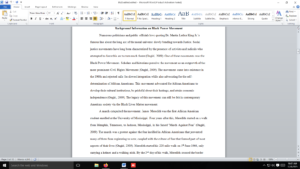International human rights system
12-15 page paper based on one of the following prompts. Additional articles (which i will provide several) must also be read and cited in this paper and alluded to, in additon to whatever research you may do.
DO PROPER SUBHEADINGS
START WITH INTRO END WITH CONCLUSION’
Prompts
- Propose a specific reform to the international human rights system and present both arguments and responses to counterarguments for your proposal. Incorporate a discussion of the feasibility of the proposal. Explain the relevance of your proposal to a current human rights issue.
- Examine the role that a specific accountability approach (for example: universal jurisdiction claims, a truth commission, an international court, a reparations process) played in two or three different contexts involving mass human rights violations. Discuss what worked and what did not work. Offer lessons that you think future practitioners should draw from these examples.
- Choose a specific human rights issue in any country (including, but not limited to, the United States). Discuss and analyze whether the international human rights system and foreign actors should or should not be involved in seeking to address this issue. Explain why or why not, to what extent, and how this relates to your view of universalism and cultural relativism.
- Choose a human rights movement (past or present) and discuss what theories of rights you think informed and shaped this movement. How did this influence the human rights interventions and human rights institutions the movement prioritized?
- Pick five authors we read this semester and one real-world human rights issue. Put the authors in conversation with one another and analyze the merits and shortcomings of their views on human rights in relation to that real-world human rights issue.
- The current human rights regime is sometimes critiqued as neo-colonial. Discuss a specific aspect of this critique and offer proposals for reform or more radical change.
- What are the relative costs and benefits of reparations versus forward-looking attempts at justice? How would you propose human rights practitioners better balance these two goals in their approaches moving forward?
- Argue for a specific public policy or advocacy effort that could increase equality, informed by human rights theory and practice. Discuss the specific type of inequality the policy or effort is meant to address, what equality means in this context (including the ways in which you are defining the boundaries of the community in which inequality exists –for example: in a country, in a community, globally?, and the benefits and limitations of the human rights framework in addressing the existing inequality.
- Identify a currently discriminatory public policy, explain why it is discriminatory, and propose a reform informed by human rights theory and practice. Discuss the benefits and limitations of the human rights framework in addressing the existing discrimination.
- Use the capabilities and human rights approach to evaluate a specific public policy related to human rights, take a position on the strengths and weaknesses of the public policy, and propose any changes you would make.
- Delve into the different views of the authors we read on whether transnational human rights advocacy is solidarity or moral imperialism, examine a current human rights issue, including the role of actors that inhabit different moral communities (for example: national communities, global communities, religious communities, etc.) in addressing that issue, and develop a position. Consider what your position means for the practice of human rights activism.
- State a critique of the International Criminal Court and propose ways this critique could be addressed.
Requirements: 12-15 pages |
I chose
Choose a human rights movement (past or present) and discuss what theories of rights you think informed and shaped this movement. How did this influence the human rights interventions and human rights institutions the movement prioritized?
Answer preview
A march catapulted the movement. James Meredith was the first African American student enrolled at the University of Mississippi. Four years after this, Meredith started on a walk from Memphis, Tennessee, to Jackson, Mississippi, in his famed “March Against Fear” (Ongiri, 2009). The march was a protest against the fear instilled in African Americans that prevented many of them from registering to vote, coupled with the culture of fear that formed part of most aspects of their lives (Ongiri, 2009). Meredith started his 220-mile walk on 5th June 1966, only carrying a helmet and a walking stick. By the 2nd day of his walk, Meredith crossed the border into Mississippi, and by this time, he had been joined by a small group of photographers, supporters, and reporters. After entering Mississippi, Meredith was shot in the back, head, and neck by a White man named Aubrey James Norvel (Ongiri, 2009). Fortunately, the incident did not cost Meredith his life but prevented him from completing his march. In response to this,
[4045 Words]

International human rights system

